2016 Corporate Citizenship Conference Recap Day 2: Global Solutions at the Local Level
- Tue Mar 22 00:40:04 UTC 2016
- Patricia MacKenzie
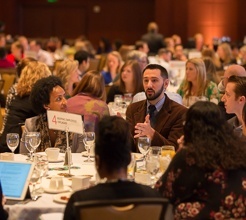 The first full day of the 2016 International Corporate Citizenship Conference was just that—full. Full of the insights and connections that will make future social, environmental, and economic progress possible. During four general sessions, 12 breakout panels, case studies, workshops, and numerous networking opportunities, CSR leaders from around the world discussed the programs that will address global problems—and their local impacts.
The first full day of the 2016 International Corporate Citizenship Conference was just that—full. Full of the insights and connections that will make future social, environmental, and economic progress possible. During four general sessions, 12 breakout panels, case studies, workshops, and numerous networking opportunities, CSR leaders from around the world discussed the programs that will address global problems—and their local impacts.
Morning collaboration and the power of reporting
The morning began with a networking breakfast, hosted by UPS. During the meal, guests were encouraged to casually network with their peers, or participate in the Idea Exchange breakfast for more structured sharing. Facilitated by CSR experts, more than 100 attendees took advantage of the opportunity to discuss corporate citizenship topics and tactics such as developing global strategies and measuring program impact.
Following breakfast, Katherine V. Smith, executive director of the Center for Corporate Citizenship, welcomed the assembled attendees to the Conference.
“There are more than 500 of us at this Conference,” said Smith. “We are honored that all of you have made the commitment to be with us for the next couple of days. Now more than ever, connecting like this is so important.”
In her remarks, Smith discussed the vital role that networks play in the advancement of corporate citizenship. She pointed to the importance of the business community in leading the charge to address major global issues.
“Networks provide the lifeblood of our work,” she said. “Whether you are working to improve education, respond to a disaster, address poverty, or manage and disclose progress on sustainability goals, networks are the conduits through which we receive the ingredients of our success—ideas and information, expertise, effort, and financial support. The opportunity and the challenge is to prepare your network to be able to respond as the context changes.”
As she closed her remarks, Smith urged those in attendance to rely on the Center for the insights, research, and connections that will enable corporate citizenship professionals to achieve together what it is impossible to accomplish alone.
“Together we can make the most of this singular moment and create a movement that employs the assets of business to achieve the goals of the Paris Agreement and the SDGs (Sustainable Development Goals),” she said.
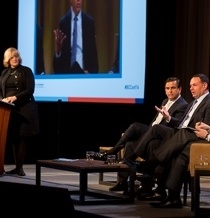 During the day’s first general session, “From a Moment to a Movement: The Role of Reporting in Achieving a Sustainable Economy,” Smith moderated an in-depth discussion from an esteemed panel comprised of Eduardo Martinez, president of The UPS Foundation and chief diversity and inclusion officer at UPS; Michael Meehan, CEO of the Global Reporting Initiative (GRI); Lance Pierce, president of CDP North America; and Tony Pipa, international policy adviser to the administrator and deputy assistant to the administrator at the USAID Bureau of Policy, Planning, and Learning. The group explored the evolution of reporting frameworks—and how they are used to help companies achieve audacious targets such as the SDGs.
During the day’s first general session, “From a Moment to a Movement: The Role of Reporting in Achieving a Sustainable Economy,” Smith moderated an in-depth discussion from an esteemed panel comprised of Eduardo Martinez, president of The UPS Foundation and chief diversity and inclusion officer at UPS; Michael Meehan, CEO of the Global Reporting Initiative (GRI); Lance Pierce, president of CDP North America; and Tony Pipa, international policy adviser to the administrator and deputy assistant to the administrator at the USAID Bureau of Policy, Planning, and Learning. The group explored the evolution of reporting frameworks—and how they are used to help companies achieve audacious targets such as the SDGs.
To begin the session, Martinez shared his thoughts on the importance of engaging with standards and frameworks to improve performance and meet goals. He spoke to the power of collective impact and discussed how UPS has benefited in partnering with organizations like GRI, CDP, and USAID.
Engaging with reporting frameworks and standards may seem daunting to the uninitiated, but private sector involvement is vital to creating and meeting meaningful targets. In his remarks, Meehan discussed the global multi-sector approach to developing guidance, and advised participants not to be overwhelmed by reporting.
“The purpose of a standard is having a common way to talk about major global issues, so you can talk about them amongst yourselves and your stakeholders,” he said.
He also advised the crowd to use reporting not only to create CSR reports, but to guide and inform strategy.
“When it comes to reporting, the right focus is on process—by which you understand the risks and challenges that are facing your organization," he said. “Reporting is your roadmap to how your company can achieve and track your progress toward achieving goals.”
The panel discussed the development of the SDGs, which—for the first time—invited the private sector to the table. Business was encouraged to actively engage in both creating and attaining the 17 goals.
“When the President adopted these goals, he was very clear that the next chapter of development can’t just be about what government can do, but must harness the resources of the interconnected world,” said Pipa.
In his remarks, Pierce discussed the evolution of reporting, and stressed that social and environmental dimensions can no longer be evaluated separately. In order to reach the targets outlined in the Paris Agreement and the SDGs, corporate citizenship professionals must view global challenges as interconnected—and they must report on them accordingly.
“We’re looking at a future where resources will be scarce, where there will be more people, where climate change will be challenging not only the environment, but also the economies and the people in the communities," said Pierce. “The data platforms that are out there, they help align and converge these big trends that are taking place and help companies align their work around achieving the Paris goals and the SDGs.”
Reporting can often aid a company in determining where their unique resources are best allocated. Martinez spoke to how reporting has helped UPS make the most of its supply distribution and logistics capability, and assisted in identifying the opportunities that UPS has to use the assets of its business to address significant issues.
“When we looked at measurement, and we looked at ways to have greater impact through disaster relief technology, we saw a lot of opportunities with partners that are engaging not only disaster relief, but also preparedness and post-crises recovery,” said Martinez.
To illustrate his point, he shared UPS’s video “UPS Relief Link,” which took home a top prize in last year’s Corporate Citizenship Film Festival. The video highlighted the vital technical and logistical support UPS has offered to refugee camps in Mali.
Following the Haitian earthquake in 2010, UPS adapted its proprietary UPS Trackpad package-tracking technology to minimize violence and chaos during the distribution of relief supplies, ensuring that each family received an equitable distribution of supplies. Based on this initiative’s success, UPS and the UN Refugee Agency (UNHCR) developed a NEXT Generation Tracking System for use in refugee camps, which could have a tremendous impact on the lives of refugees and provide a new level of efficiency for UNHCR.
The video illustrated an often overlooked fact—that society is making significant forward progress. Pipa discussed a few of the many Millennium Development Goals that were achieved, but cautioned the audience that true systemic progress must be considered broadly. Without careful measurement, advancement in one area may actually come at the expense of another.
“The challenge for the SDGs is how do you make progress on social and human development goals, while at the very least not backsliding on environmental and economic sustainability,” he said. “How do you make all this progress at the same time? Data. Data will allow us to understand what types of interventions are enabling us to make that progress on several fronts at once.”
Pipa also urged attendees to look for ways to partner with public-sector organizations to advance social, environmental, AND business imperatives. “We’re increasingly looking for ways to use our investments in developing countries in a way that leverages and catalyzes public investment,” he said.
The session closed with a discussion of how to engage employees in reporting, and how to strategically invest in initiatives at the local level to drive global impact. Martinez shared a video titled, “Your Wishes Delivered: Mr. Brown’s Books,” which took a look at how UPS logistics experts gave their time to organize Mr. Brown’s International Booksmart Foundation, which collects and delivers textbooks for children in Africa. This effort not only benefited Mr. Brown’s organization, Martinez argued, it also contributed to the fourth SDG Goal: Ensuring inclusive and quality education for all and promoting lifelong learning.
“Our approach is to not only have systemic global impact with global programs with partners like those on this stage, but also to distill the SDGs down, engage our people, and know that efforts like this also help the SDGs,” he said.
The general session was followed by an on-site volunteer project, sponsored by Insperity, Inc. To provide comfort to local children in need, many attendees joined Insperity in creating their own stuffed animals. The volunteers filled, dressed, and personalized their toys, which benefited Wellstar Pediatric Foundation and Gwinnett Medical Center Foundation.
At 10:30 a.m., attendees broke into smaller groups to attend one of the morning’s six breakout sessions, which included four panelist discussions covering topics ranging from water scarcity to small program strategies, a CSR communications workshop led by Center for Corporate Citizenship Teaching Fellow Nancy Dunbar, and a deep dive into the skills-based volunteering component of Vanguard’s leadership development program.
Afternoon insights: sharing solutions
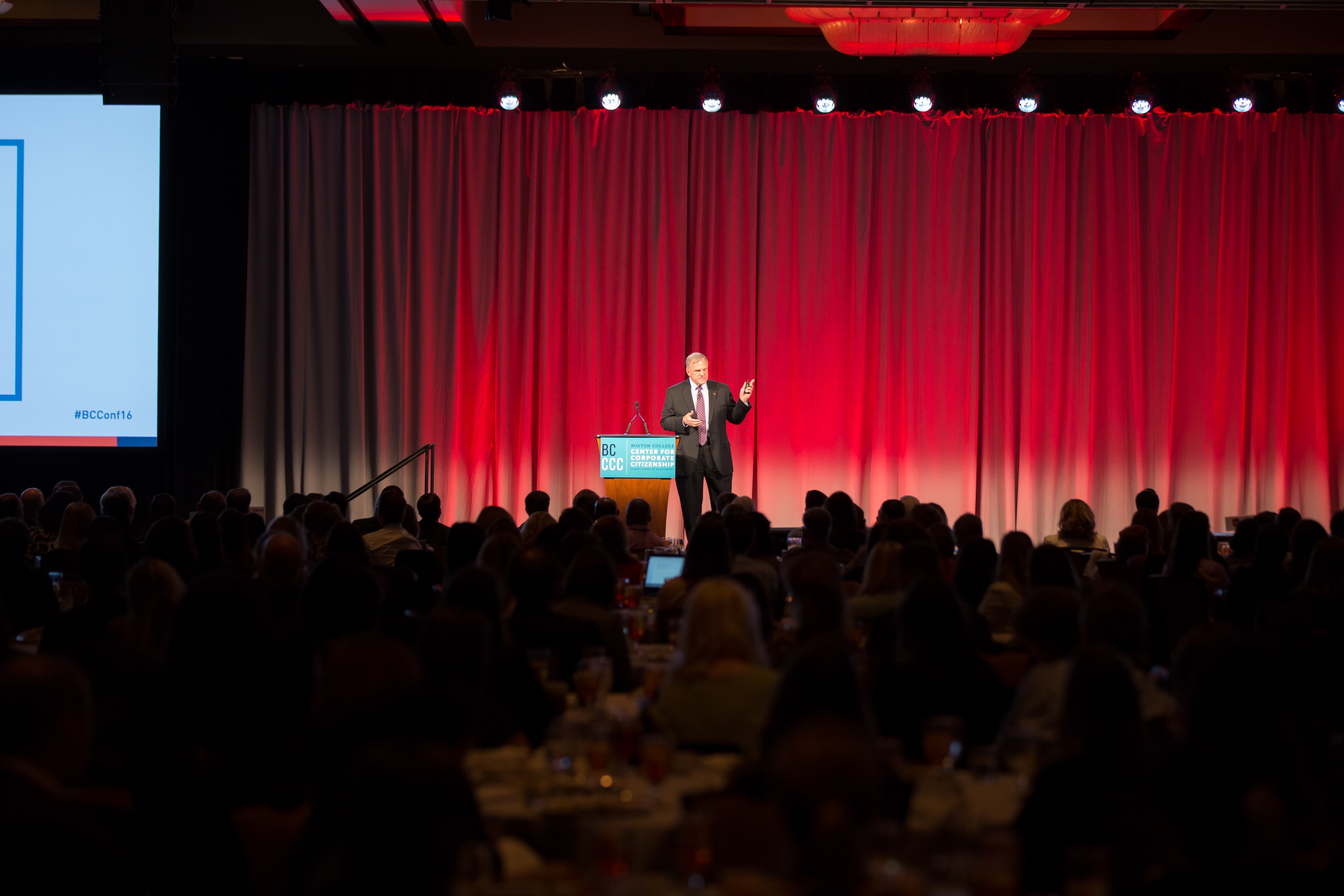 Following the breakout sessions, attendees were back in the Grand Ballroom for a networking lunch and the second general session, titled “Golf Gives Back: Using Sports as a Platform for Community Engagement.” During this session, Travelers executives Andy Bessette, executive vice president and chief administrative officer, and Marlene Ibsen, vice president of community relations, shared insight into how the company grew the Insurance City Open, the Travelers Championship, into a world-class PGA TOUR event—one that donates 100 percent of its net proceeds to charity and provides international exposure for the state and the region.
Following the breakout sessions, attendees were back in the Grand Ballroom for a networking lunch and the second general session, titled “Golf Gives Back: Using Sports as a Platform for Community Engagement.” During this session, Travelers executives Andy Bessette, executive vice president and chief administrative officer, and Marlene Ibsen, vice president of community relations, shared insight into how the company grew the Insurance City Open, the Travelers Championship, into a world-class PGA TOUR event—one that donates 100 percent of its net proceeds to charity and provides international exposure for the state and the region.
During his remarks, Bessette laid out the history of the Travelers Championship, which has generated more than $10 million for more than 500 charities since 2006—increasing from $325,000 in 2006 when Travelers first took over the event to more than $1.56 million in 2015. These impressive results illustrate Travelers’ deep foundational commitment to giving back to the communities in which it operates.
“Travelers prides itself on being a thoughtful and understanding corporate citizen,” said Bessette. “We believe that doing business comes with an obligation to support the community.”
Bessette argued that partnerships are the secret to creating an engaging event that consistently delivers benefits to both the community and the business. He discussed how Travelers leverages their employees, partners, players, fans, customers—and even celebrities—to create a world class event. He talked about how listening to all of these stakeholders has directed their focus, leading to initiatives such as Operation Shower and Women’s Day to engage a broader population that gold tournaments traditionally reach.
Bessette closed his portion of the session by advising the crowd to put as much focus on ensuring the quality of the event as they do in their commitment to charity. “Unless you put on a world class show, you can’t have world class giving, and world class community involvement,” he said.
During her remarks, Ibsen took a deeper look at the causes the Travelers Championship benefits, discussed why these organizations were selected, and how Travelers engages with them to ensure the greatest possible value.
“When we first became the title sponsor of the Travelers Championship, we knew having a designated charity was important,” said Ibsen. “We initially selected The Hole in the Wall Gang Camp, a residential summer camp and year-round center designed to serve children and families coping with cancer and other serious illnesses.”
When their former CEO, Jay Fishman, was diagnosed with ALS, Travelers decided to temporarily shift their signature cause.
“We decided to focus the charities this year on ALS to raise awareness and raise funds in honor of Jay,” she said. “The primary beneficiaries are the Bruce Edwards Foundation and the Hospital for Special Care, based in New Britain, Connecticut.”
In 2015 alone, the Tournament generated a record of $1.56 million for 14 charities; however, the impacts of the Travelers Championship aren’t purely financial. The company has also partnered with organizations like INROADS, an organization that places ethnically diverse students in organizations to prepare them for corporate and community leadership.
“We partner with five or six other companies to get all of our summer INROADS students out to the tournament as volunteers, and also create opportunities to better their networks,” said Ibsen.
To close the session, Ibsen discussed the significant benefits the tournament brings back to the business in the form of employee engagement.
“Travelers has always had a lot of employees involved in volunteering at the tournament. It’s an event that is run by 4,000 volunteers, and last year we worked up to 1,700 employees that volunteered for at least a day, logging 7,000 volunteer hours.”
Following the lunch session, attendees took advantage of a second set of breakout sessions, featuring an EY case study focusing on developing a successful education program, an employee engagement workshop, and four panel discussions, including one exploring the theme of the Conference—Global Citizen’s/Local Communities—led by Center Executive Director Katherine V. Smith.
In that session, the panel—which included leaders from The UPS Foundation, Texas Instruments, Verizon, and the United Nations Ombudsman and Mediation Services—discussed the global issues that are impacting even our smallest communities, and the local efforts underway that are helping to achieve global progress.
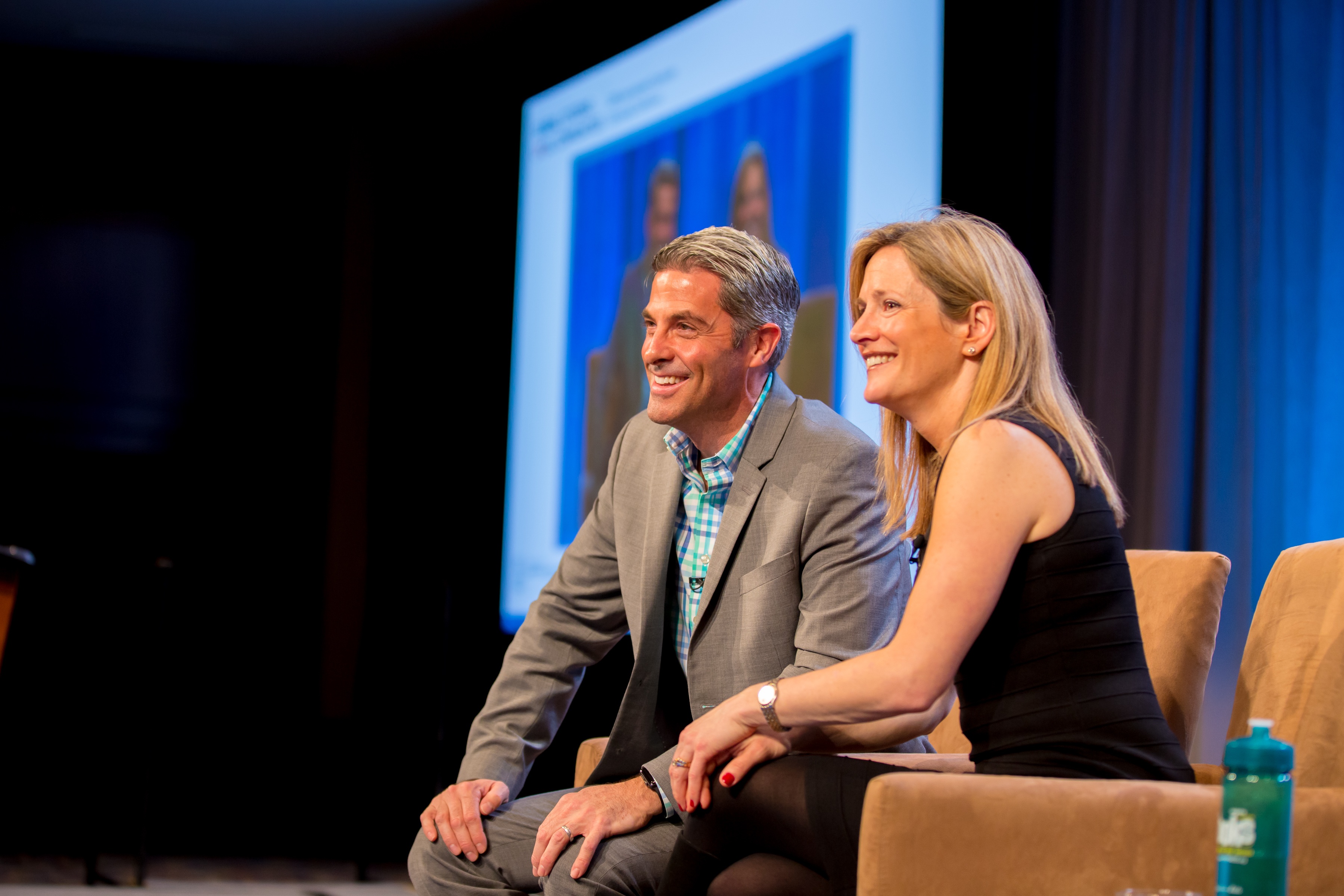 The day’s third general session was hosted by Reebok, and focused on the company’s inspirational signature program, BOKS (Build Our Kids’ Success). BOKS founder and Reebok Director of Social Responsibility Kathleen Tullie was joined by Jeff Bellows, vice president of corporate citizenship and public affairs at Blue Cross Blue Shield of Massachusetts, to discuss the importance of fighting childhood inactivity, and illustrate the power of strategic partnerships.
The day’s third general session was hosted by Reebok, and focused on the company’s inspirational signature program, BOKS (Build Our Kids’ Success). BOKS founder and Reebok Director of Social Responsibility Kathleen Tullie was joined by Jeff Bellows, vice president of corporate citizenship and public affairs at Blue Cross Blue Shield of Massachusetts, to discuss the importance of fighting childhood inactivity, and illustrate the power of strategic partnerships.
Tullie opened the session by discussing what inspired her to found BOKS. Frustrated by the increasing physical inactivity of children and the diminishing time allotted to exercise in schools, Tullie—along with a group of like-minded moms—created the free before- and during-school program to get kids active and energized for a day of learning. She found support at Reebok, which was so inspired by the grassroots initiative that it decided to make it its signature cause.
“Reebok wanted to make a change—and help take us from a culture of spectators to a culture of participants, said Tullie. “Together, we are on a mission to promote the profound impact of physical activity on child’s mind, body and community.”
It’s an objective shared by her strategic partners. At Blue Cross Blue Shield of Massachusetts, corporate citizenship practitioners had just redefined their CSR strategy, and found that it aligned closely with the mission of BOKs.
“Over the past six years, we have evolved our strategy to have more of a focus,” said Bellows. “Now, we are committed to maintaining healthy lifestyles and increasing access to environments that inspire healthy living and eating.”
Bellows noted that the partnership with Reebok and BOKS has helped Blue Cross Blue Shield of Massachusetts deepen its community involvement, and also brought benefits back to the business.
“We were able to expand to geographies we may not have otherwise had a presence in,” he said.
During the session, participants were persuaded to experience the benefits of activity for themselves, taking part in multiple rounds of musical chairs, complete with squats and pushups. Through their laughter, many noted the positive effects of the brief bout of exercise—effects that Tullie maintains are the key to BOKS’s success.
“In the end, we have to be held accountable for kids’ physical activity levels—if you have a healthy child you’re going to have a healthy learner—and you’re going to have a happier kid,” she said.
Evening networking and learning
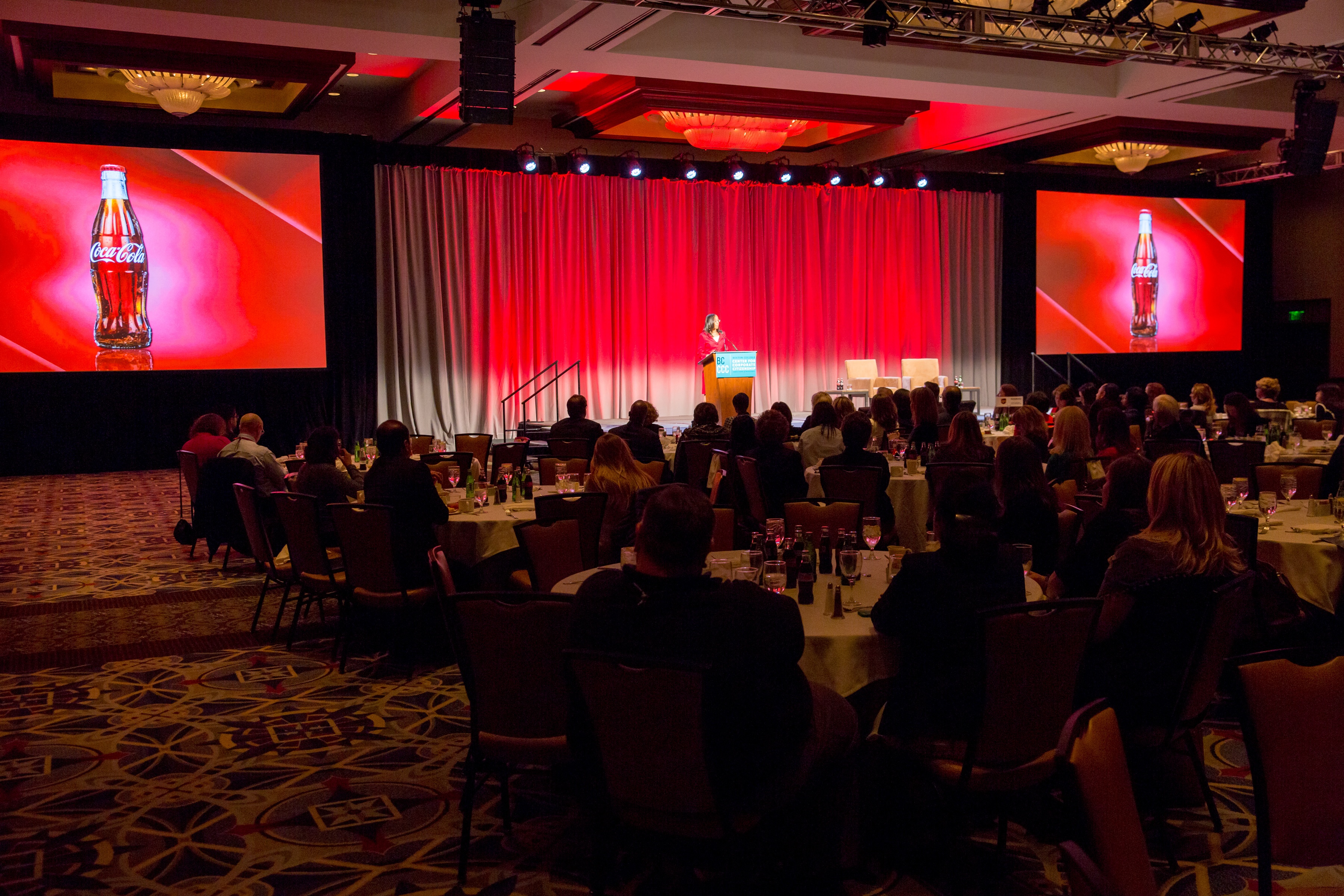 The evening began with a cocktail reception, hosted by Turner in the Omni’s stunning Atrium Terrace, followed by a networking dinner—as well as the day’s final general session—hosted by The Coca Cola Company. During this session, Lori George Billingsley, vice president of community relations at Coca-Cola North America, shared the company’s unique approach to addressing local community challenges through philanthropy and Golden Triangle Partnerships.
The evening began with a cocktail reception, hosted by Turner in the Omni’s stunning Atrium Terrace, followed by a networking dinner—as well as the day’s final general session—hosted by The Coca Cola Company. During this session, Lori George Billingsley, vice president of community relations at Coca-Cola North America, shared the company’s unique approach to addressing local community challenges through philanthropy and Golden Triangle Partnerships.
Billingsley began the session by explaining her personal connection to social advancement, which began as a young girl raised by community-minded parents. From an early age, she was taught that there was important work to be done, and that it can’t be done alone.
She found this commitment shared by The Coca-Cola Company, which has a long history of bringing people together. She reminded the audience of this history, illustrated through the company's famous Hilltop commercial from 1970. She then shared with the crowd her four keys to effective partnerships, which include:
- focus
- close to communities
- comprehensive
- engage all sectors
She highlighted Coca-Cola’s three focus areas—water, women, and well-being—as well as examples of how the company strives to tailor these focuses to local needs.
“Committing to a local focus has made our corporate citizenship engagement much more impactful,” said Billingsley.
Corporate citizenship efforts are most effective when they leverage all the available resources of the company. Billingsley highlighted a number of efforts that made use of not only Coca-Cola monetary donations, but also of time and talent as well, including Coca Cola’s First Generation Scholars Program.
“Since its founding in 1993, the Coca-Cola First Generation Scholarship program has enabled 2,800 students to be the first in their families to go to college,” she said.
Before opening up a rousing Q&A session with her colleague Helen Smith Price, executive director of the Coca-Cola Foundation, Billingsley closed her talk with a look at what Coca-Cola’s Chairman and CEO Muhtar Kent calls a golden triangle partnership—Coca-Cola’s 5by20 program—which has a goal to empower five, million women by the year 2020. Golden triangle partnerships bring the efforts of business, government, and nonprofits to bear to help solve complex, yet vital issues.
“At Coca-Cola, we firmly believe that there are few issues that will define the 21st century more than the empowerment of women,” said Billingsley. “It is in fact one of our global strategic priorities. While we are able to do well alone, we know that our impact can be greater when we work together. Since 2010, we’ve empowered nearly one million women in 52 different countries. That success comes on the backs of our esteemed partners in local governments as well as UN Women, Technoserve, Bill & Melinda Gates Foundation, and the Inter-American Developmental Bank.”
Want more updates on the Conference? Subscribe to the Corporate Citizenship Blog by clicking below.

